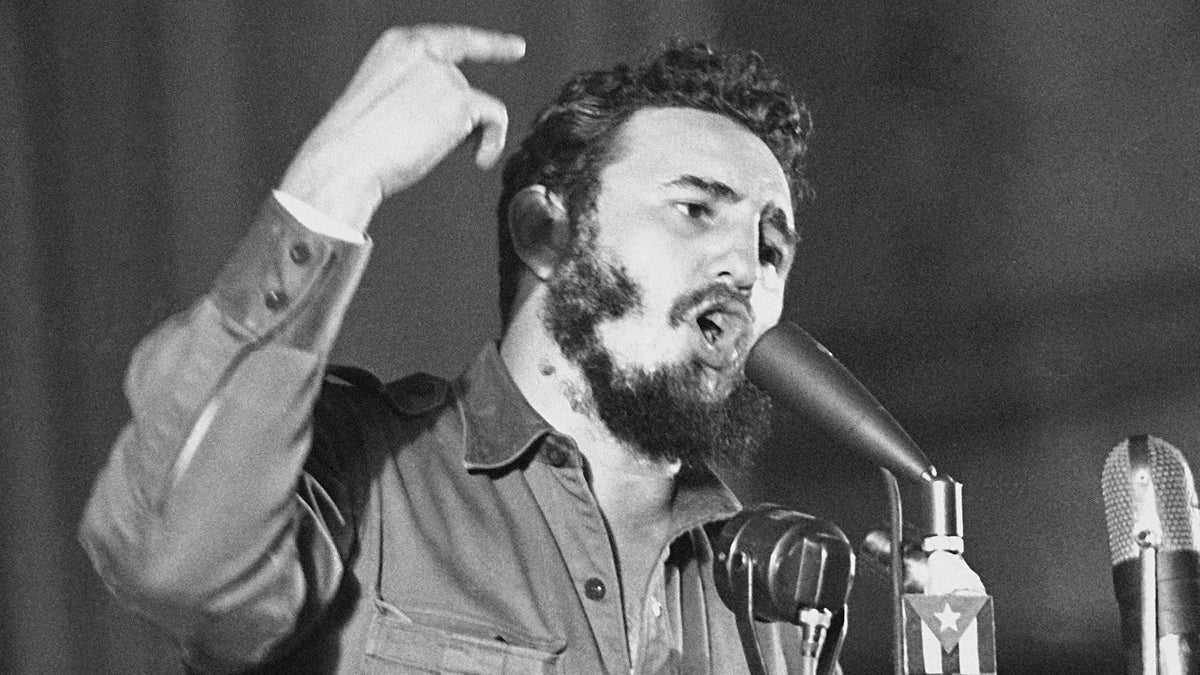Farewell to Fidel, with open eyes

Cuban Prime Minister Fidel Castro told a massive May Day rally in Havana that the U.S. State Department is preparing "an aggression against Cuba through Guatemala"
When I heard about Fidel Castro’s death, I joked that the 1961 CIA had finally gotten the guy’s beard to fall out.
But seriously, folks. Fidel’s passing is worth a few words this holiday weekend, and I’ll do so with open eyes, minus the lazy celebrity lionizing that has often blinded liberal Americans to the reality of his authoritarian rule.
Yeah, he pioneered good medical care — as his First World defenders have long reminded us. But as Carlos Eire, a Yale history professor and Cuba native, points out, the “intellectuals, journalists and educated people in the First World…would have been among the first to be jailed or killed by Castro in his own realm.” Indeed, “he was responsible for so many thousands of executions and disappearances in Cuba that a precise number is hard to reckon. He brooked no dissent and built concentration camps and prisons at an unprecedented rate, filling them to capacity, incarcerating a higher percentage of his own people than most other modern dictators, including Stalin.”
Supermodels like Kate Moss said back in the day that Fidel was “an inspiration to everyone.” Try squaring her assessment with the experience of Cuban poet Armando Valladares. He was jailed by Fidel and later said: “There have been few examples of repression of homosexuals in history as virulent as in Cuba.”
And Carlos Eire tops his list of well-documented human rights abuses with this tidy item: Fidel “nearly caused a nuclear holocaust.”
For me, that’s the deal-breaker.
The amnesiacs and ahistorical romanticizers should study the Cuban Missile Crisis of 1962. That’s when Fidel urged Soviet Premier Nikita Khrushchev to consider launching a first nuclear strike on the eastern seaboard of the United States. In a letter to Krushchev on Oct. 26, he said that if the Americans try to invade the island, “that would be the moment to eliminate this danger forever, in an act of the most legitimate self-defense. However harsh and terrible the solution, there would be no other.” (My italics.)
That advice was too much even for Khrushchev, who subsequently told Fidel in writing that government leaders can’t allow themselves to be “swept away by the popular feelings of hot-headed elements…If we had refused a reasonable arrangement with the U.S., a war would have left millions of dead and survivors would have blamed their leaders.”
I still take Fidel’s hot-headed ‘tude personally. In October of 1962 I was a little kid on the eastern seaboard, packing away my baseball glove for the winter, having just watched the Yankees beat the Giants in seven games. The way I see it, Fidel wanted me dead, “however harsh and terrible the solution.”
So, given his long track record, why did so many Americans succumb over the years to Castro-chic?
“Because deceit was one of Fidel Castro’s greatest talents,” writes Eire, “and gullibility is one of the world’s greatest frailties. A genius at myth-making, Castro relied on the human thirst for myths and heroes. His lies were beautiful, and so appealing.”
Wait a sec. A talent for deceit, myth-making genius, beautiful lies, hot-headedness…Does that sound like anyone we know? Endemic gullibility…Does that sound like any electorate we know?
Authoritarians die, and new ones arrive. Let us live 2017 with our eyes open.
Follow me on Twitter, @dickpolman1, and on Facebook.
WHYY is your source for fact-based, in-depth journalism and information. As a nonprofit organization, we rely on financial support from readers like you. Please give today.

